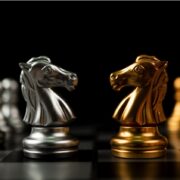Playing a TV game show exactly the way it’s played on TV would be great entertainment, no doubt. The truth is, however, that the rules of a TV game show won’t always work with your training session or the training goals you want to accomplish. You should feel free to change the rules to fit your purpose-in fact, whenever we play game shows, we make a few regular changes to enhance the effectiveness of the game show. Here are our most common rule changes:
1. Answering in a particular way is not necessary. We rarely require a team to answer in a particular format for the sake of complying with a game show format. For example, answering in the form of a question in a Categories (or Jeopardy!-style) game show is not necessary (but no points are deducted if the contestants choose to answer this way. Answering in the form of a question just adds one more level of complexity to the game show (and complexity of question writing) and it can be distracting. Likewise we accept either the full answer or the letter/number of the answer for a multiple choice question.
2. Control the amount of time that contestants have to READ a question. Some game shows allow teams to “ring in” to answer a question as soon as the question is displayed. This, however, tends to favor fast readers and encourages teams to ring in first, then read the question. We adjust the read timer to be manually controlled. As soon as we’re done reading the question, we start the timer. That way everyone has an equal opportunity to read and absorb the information BEFORE contestants are jumping up and down to ring in.
3. Contestants are allowed to “get help” from non-playing audience members and other team members. Instead of requiring a participant to answer a question alone, we encourage them to consult with their entire team. That way the whole team is participating, and the pressure is off the single trainee. We may encourage audience members to “shout out” the answer. This way everyone in the room remains engaged and the energy level remains high. It’s far more important for the entire room to get and hear the correct answer than for a single person to prove their knowledge.
4. Teams must answer a question in between extraneous game show elements. Game shows like Wheel of Fortune don’t always favor a training environment. In the TV versions, contestants are required to possess a great deal of luck and in addition knowledge. In games that feature these extraneous elements (like spinning the wheel) we require trainees to answer a question (even if it’s a relatively simple one) before each element. This ensures that the game show doesn’t overshadow the information at hand.
5. Scoring: Points increase, can change, and are flexible. We modify the scoring rules for almost every game show we play:
- We increase the point values between rounds so that teams that are behind have a chance to catch up.
- We increase point values within a round to correspond with the difficulty level of a question.
- We allow point increases for extra credit (I.e., we’ll throw a verbal follow-up question out to a team spontaneously) to increase the educational potential of the game.
- We may allow partial credit for half-right answers, or where there’s an answer dispute.
- We allow teams that are behind in points to participate in final rounds. For example-even if a team has a negative point value, they’re still given points to wager with in a Final Jeopardy!-style situation.
- We never make the penalty for answering incorrectly greater than the reward for a correct answer.
Bonus: All judges’ decisions are final. One rule that we ALWAYS add at the beginning of a game show is: All Judges’ Decisions are FINAL. We love using judges (and being judges) in our game shows. Judges can clear up point and answer disputes, and handle disruptions with ease. Judges are the enforcers of the rules (and may serve to remind your game show contestants of the rules). Judges can also add extra credit points and give half-credit for a question at their discretion. Who can be a judge? You can have a peer or a knowledgeable trainee judge-or you can be the judge yourself.


